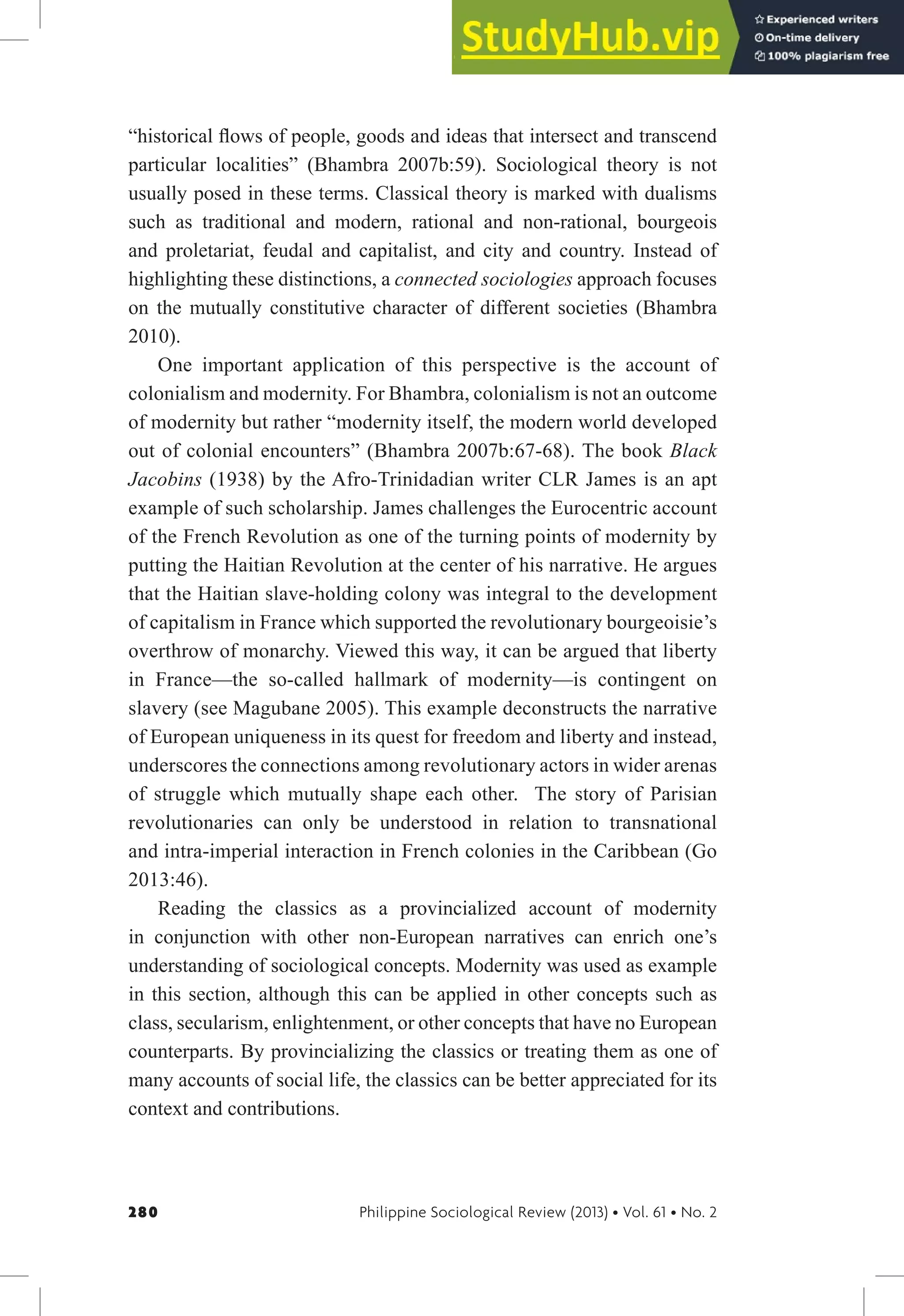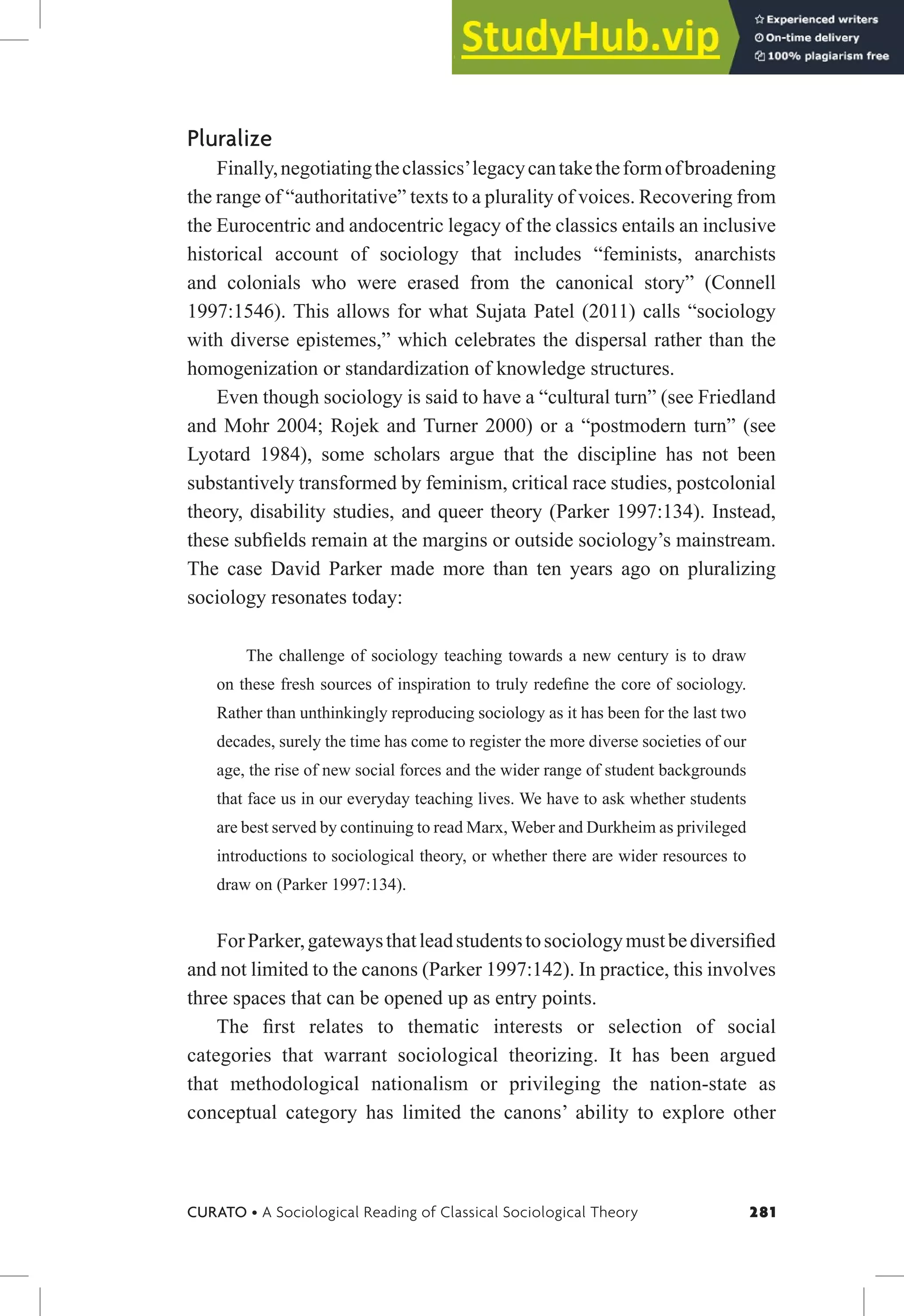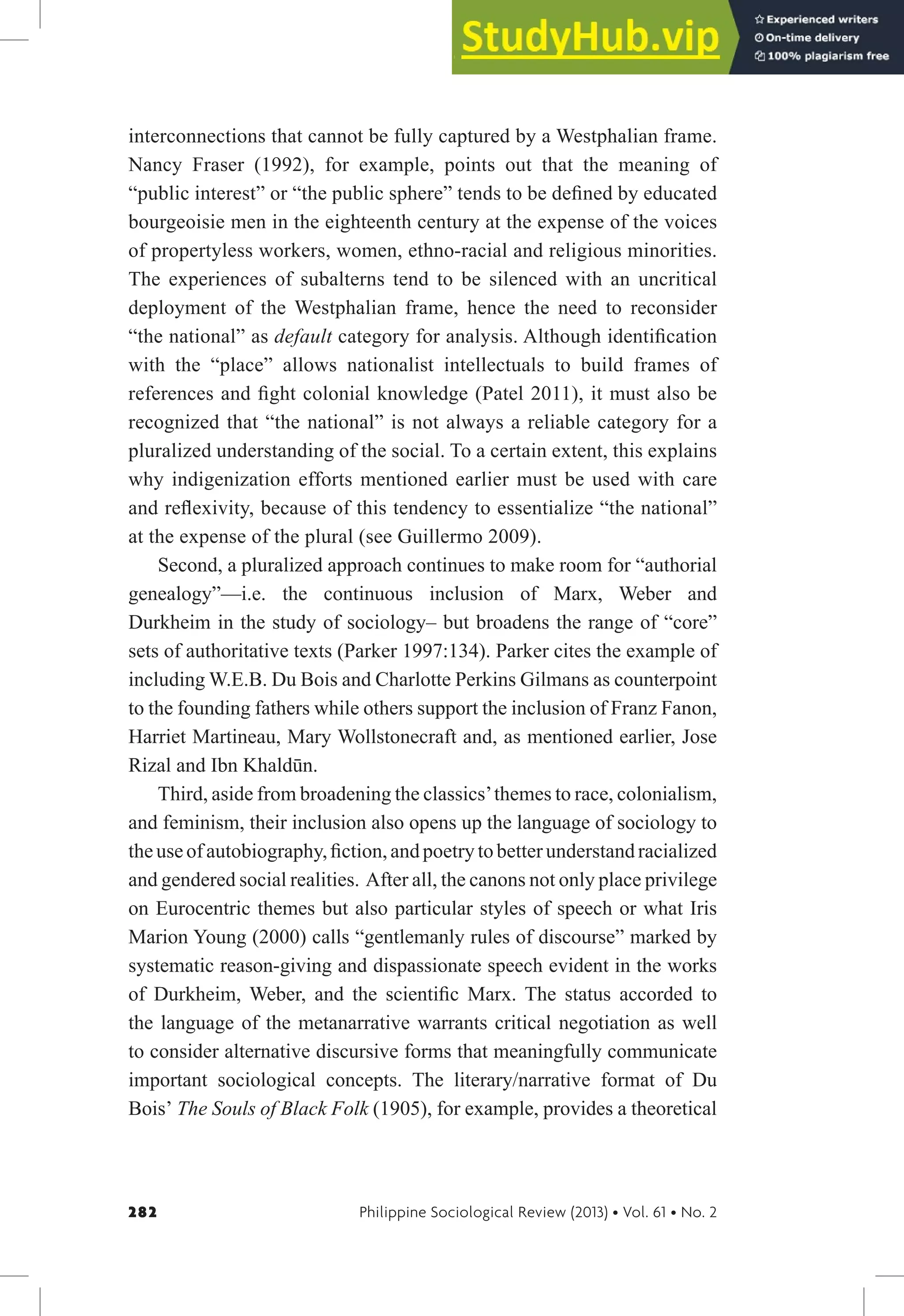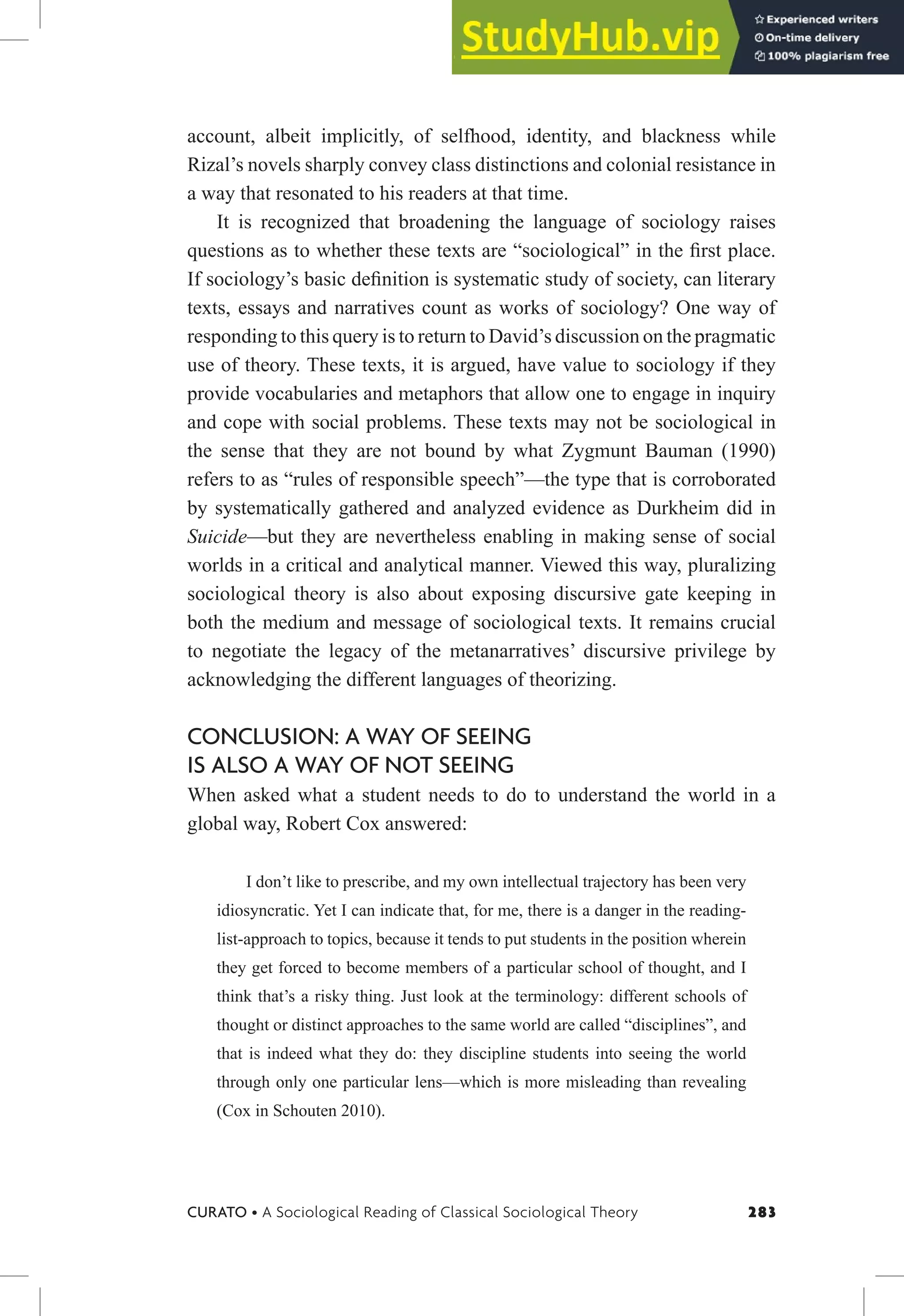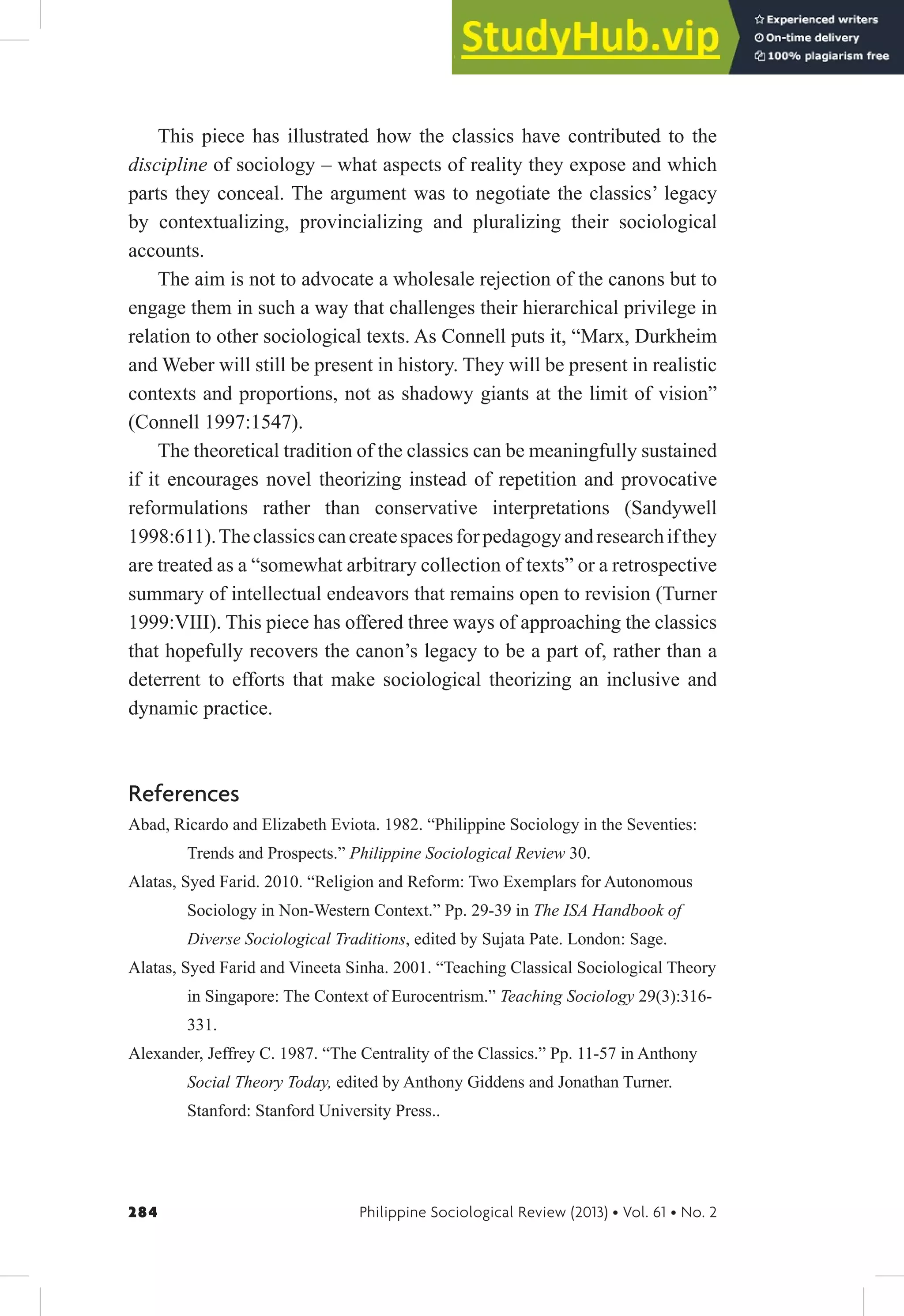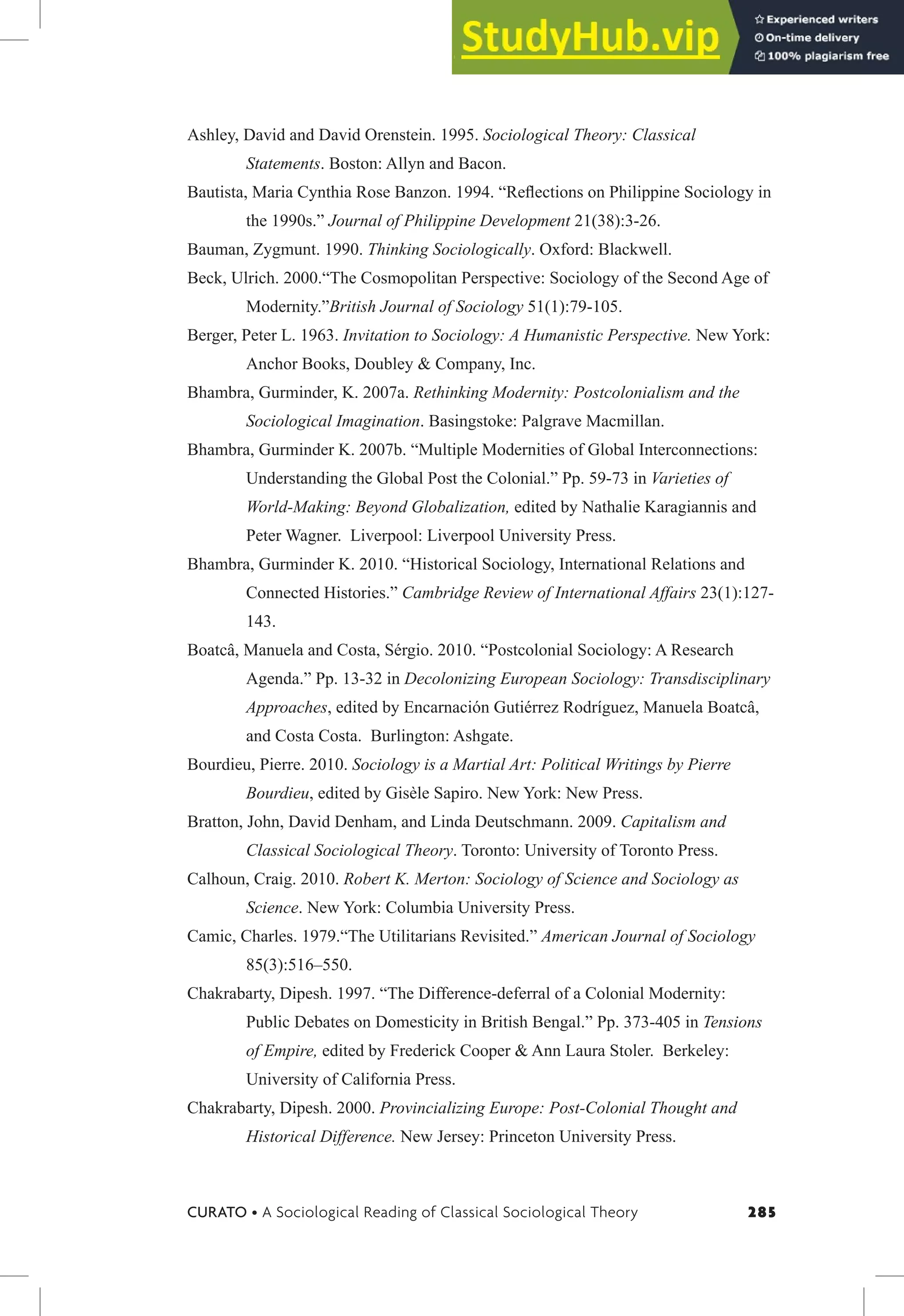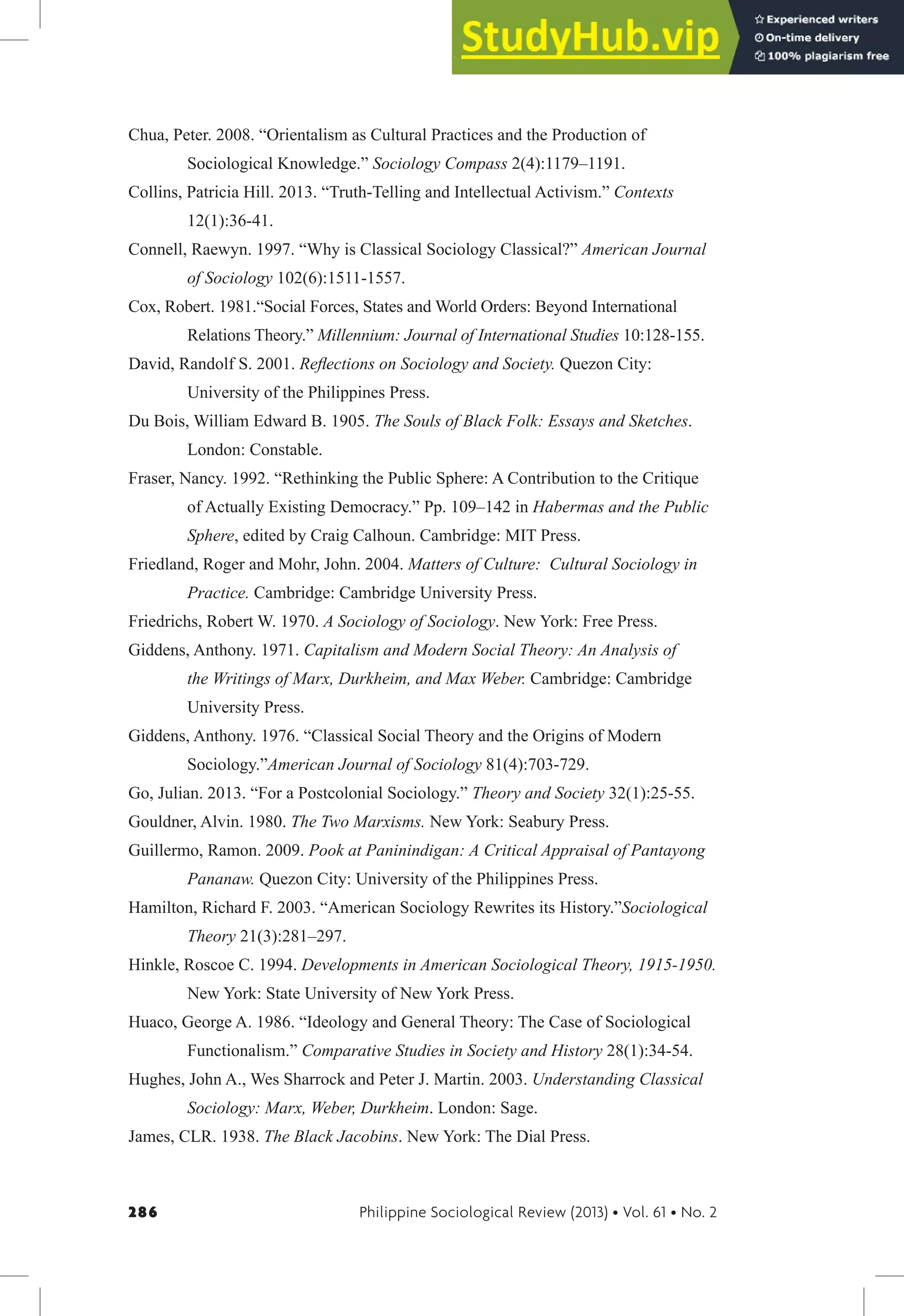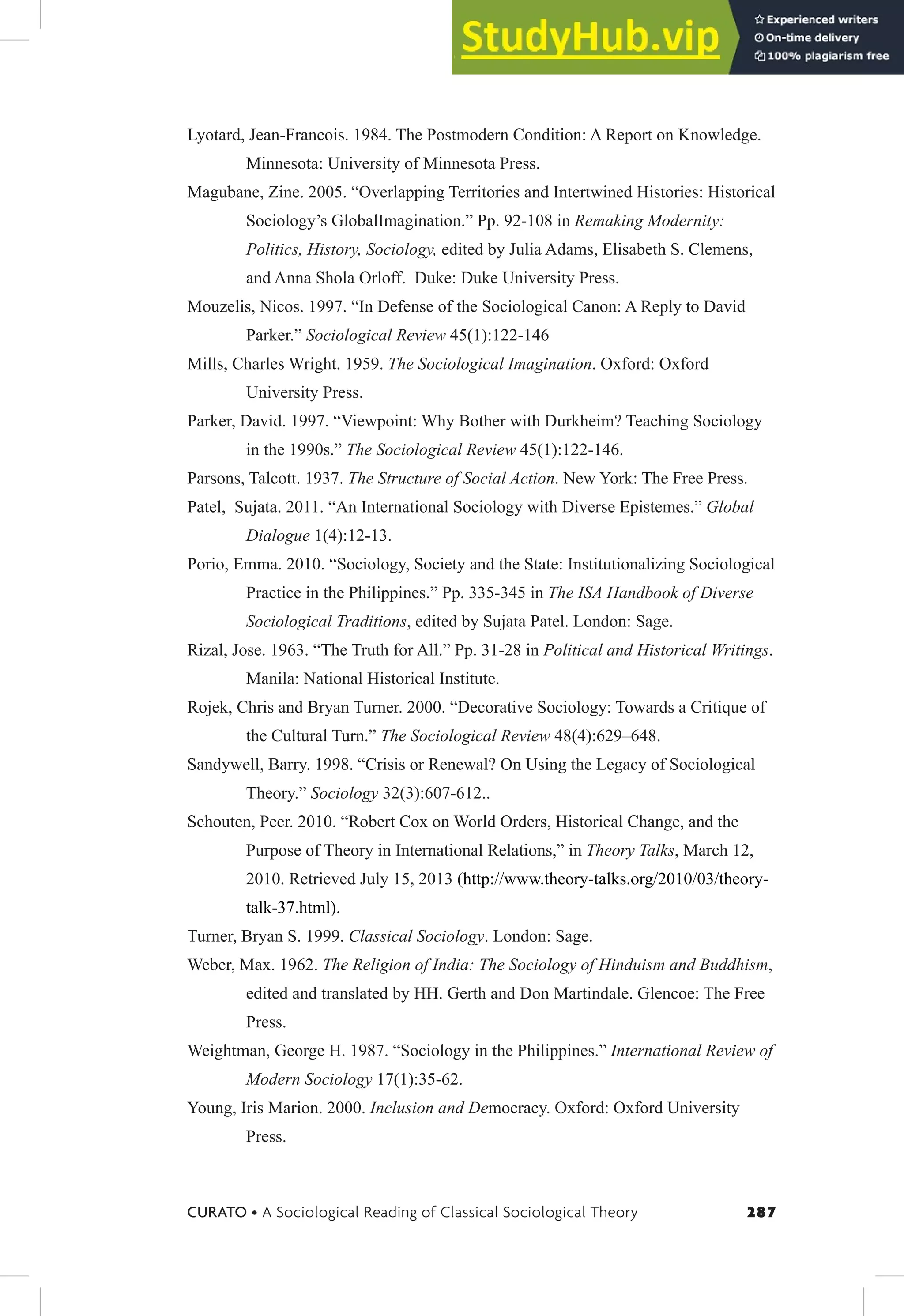This document discusses the need to re-examine classical sociological theory from Marx, Weber, and Durkheim from a more critical perspective. It argues that traditionally these theorists have been viewed as the authoritative foundation of sociology, but they were products of their time and place and reflected Eurocentric perspectives. The document proposes contextualizing the classics by considering the social and political factors that elevated their status, decentralizing the European experience as the sole focus of analysis, and diversifying entry points beyond just the canonical theorists. This would allow for a more inclusive and dynamic interpretation of classical theory.
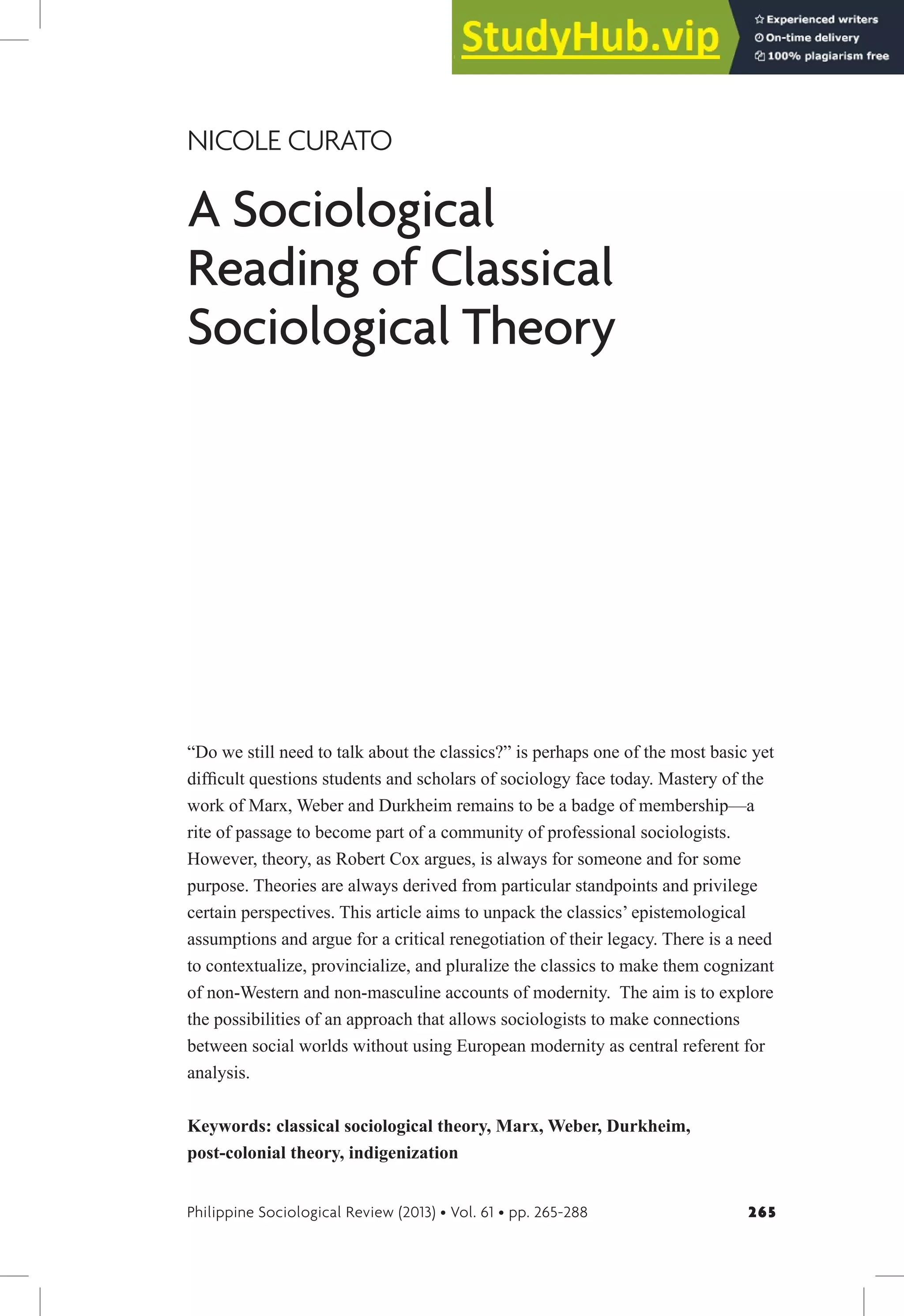
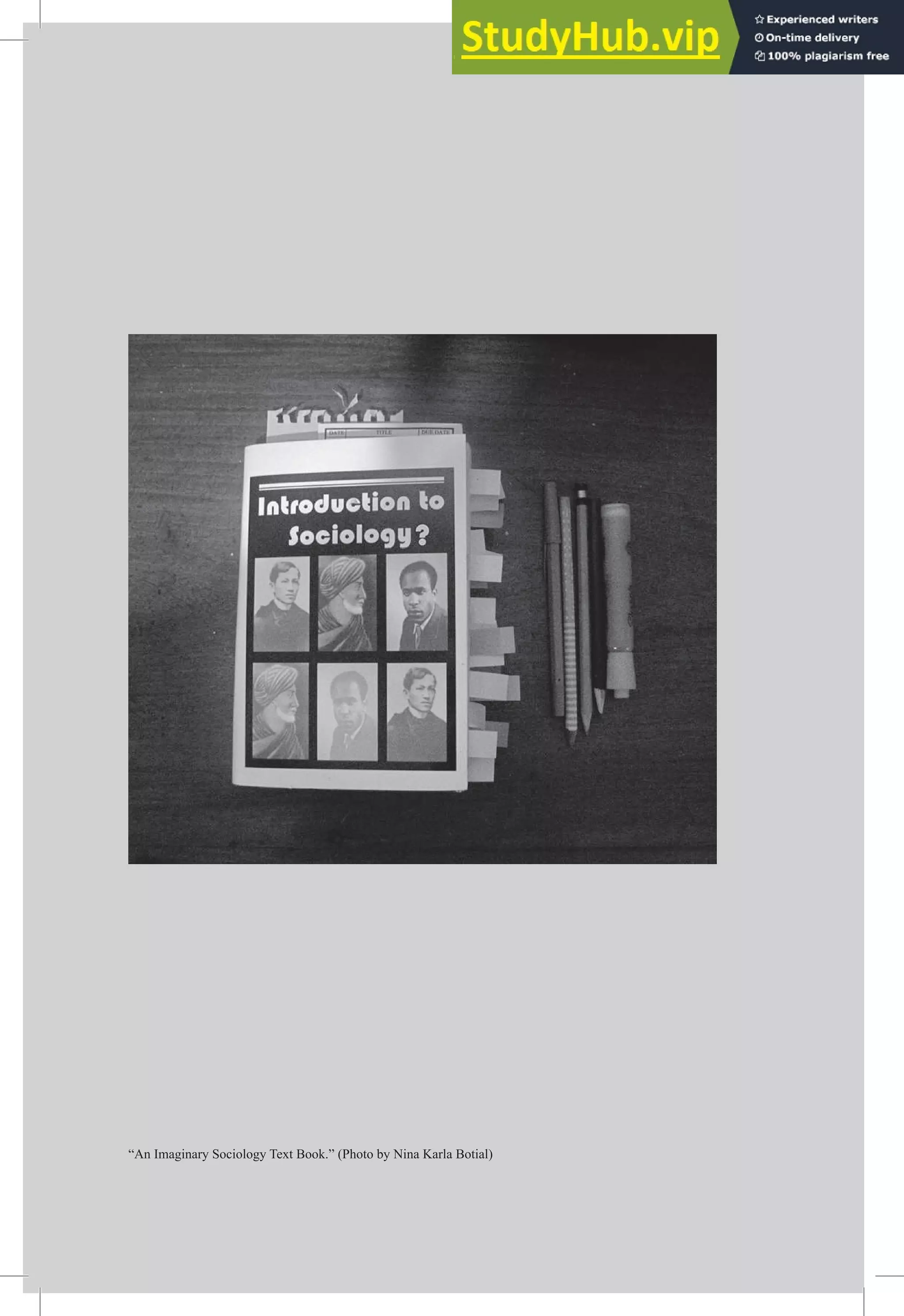
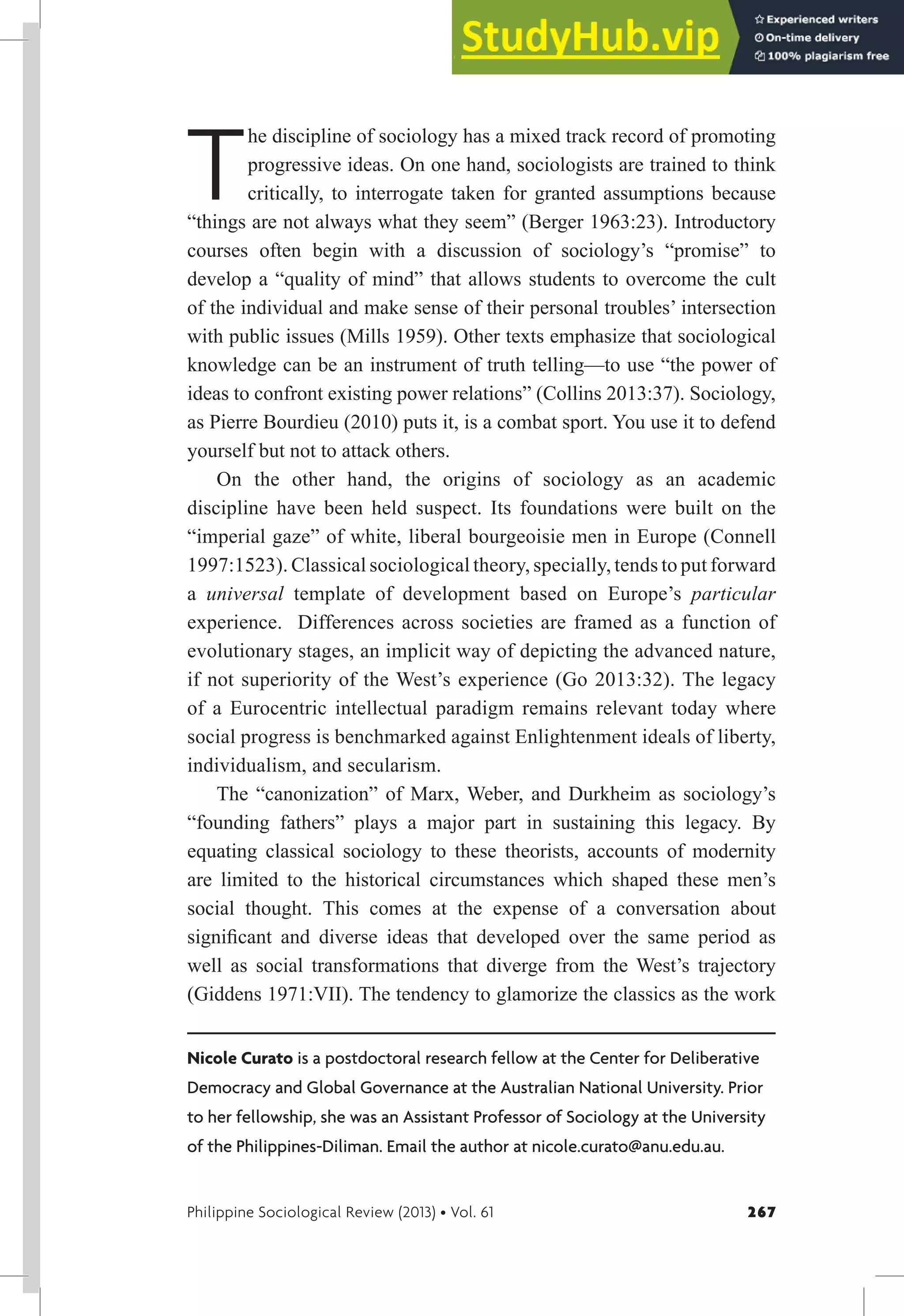
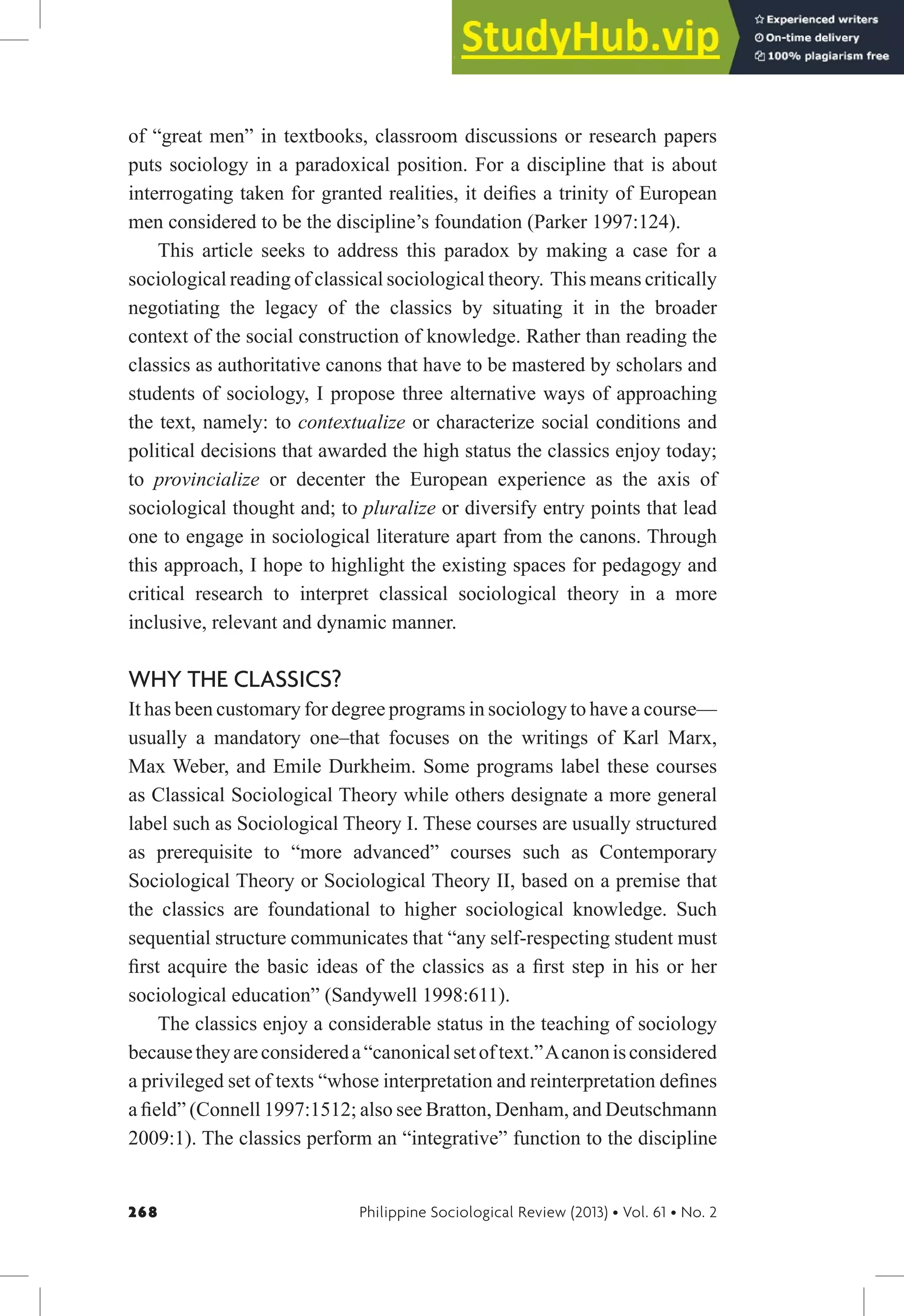
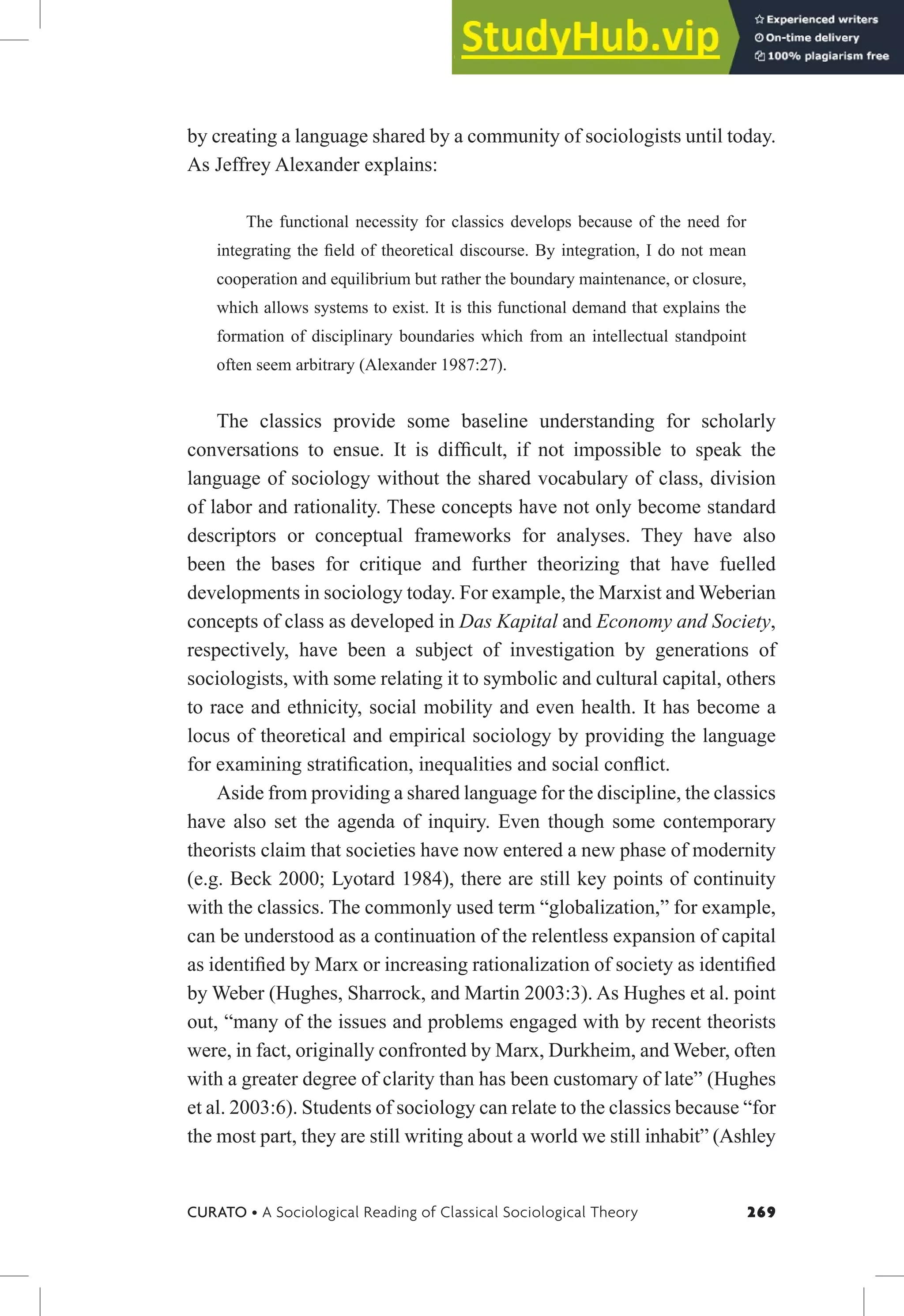
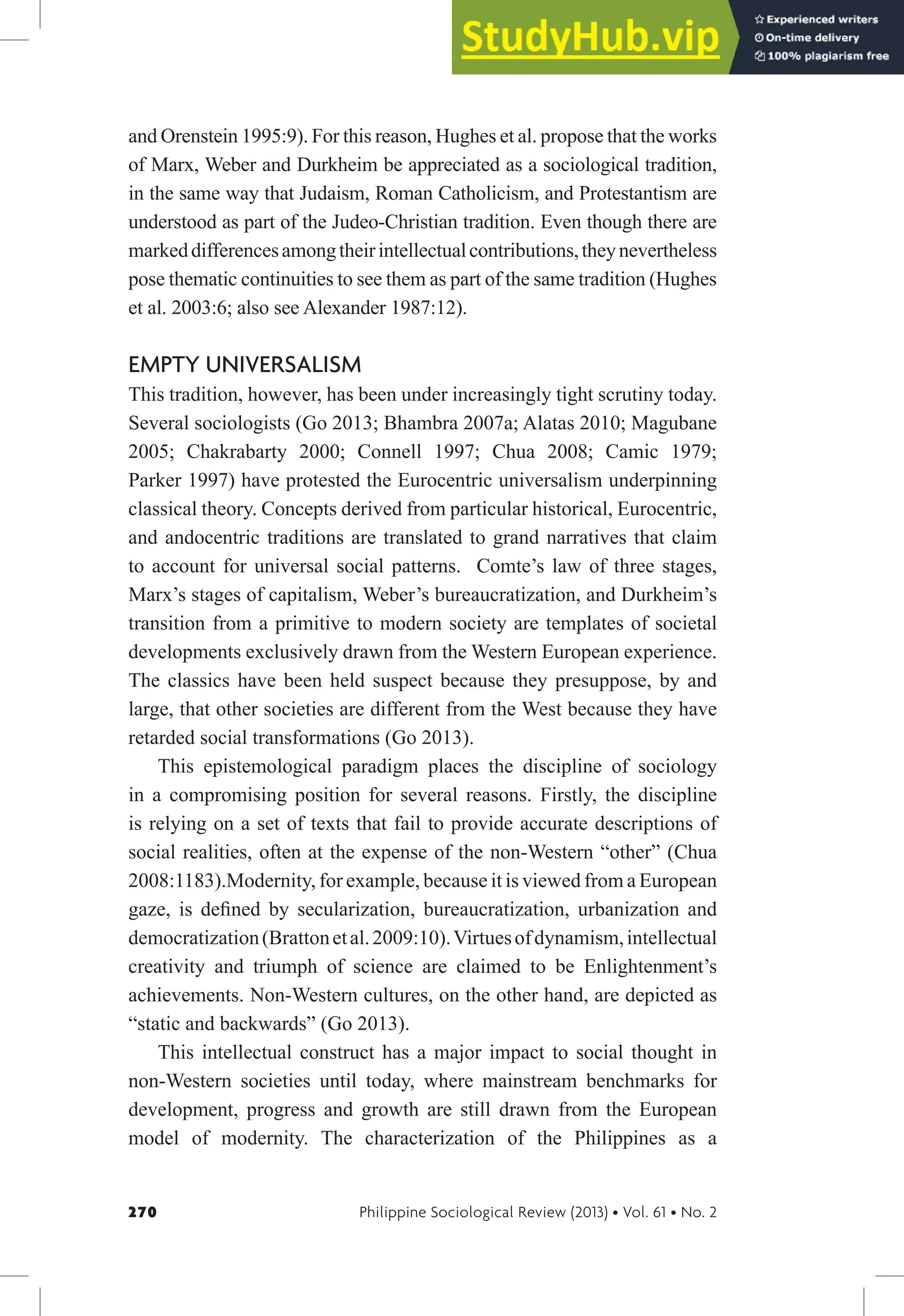
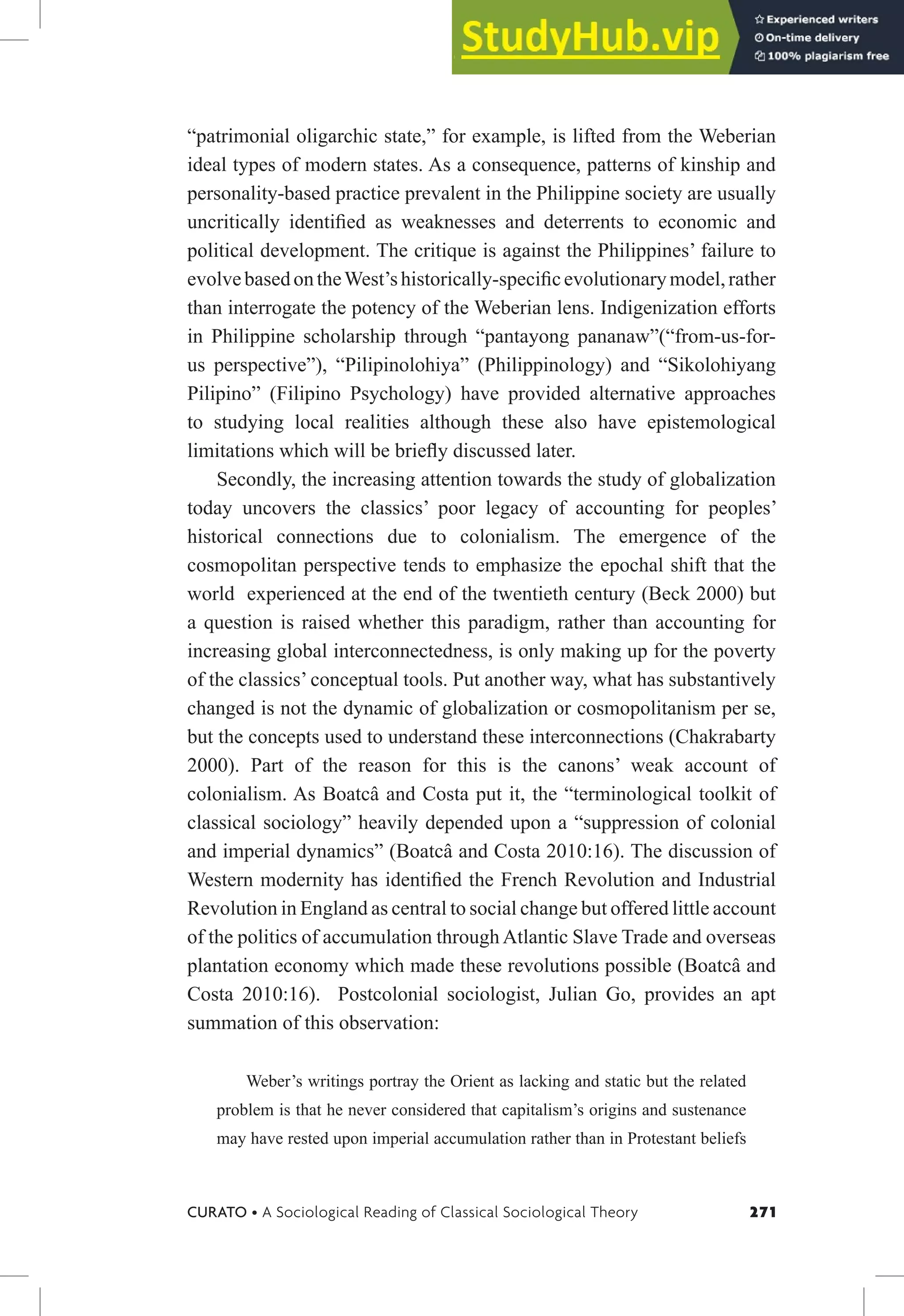
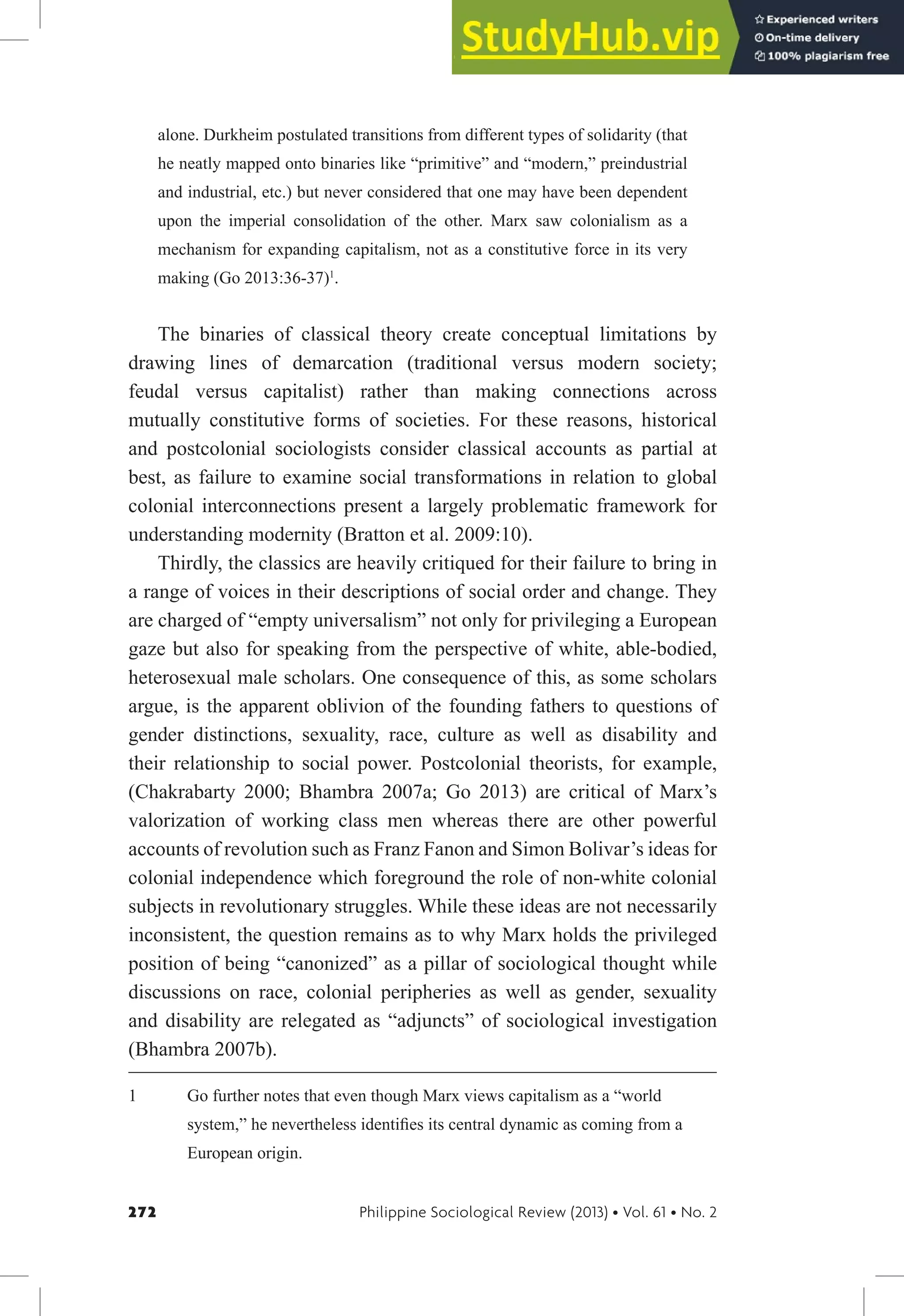
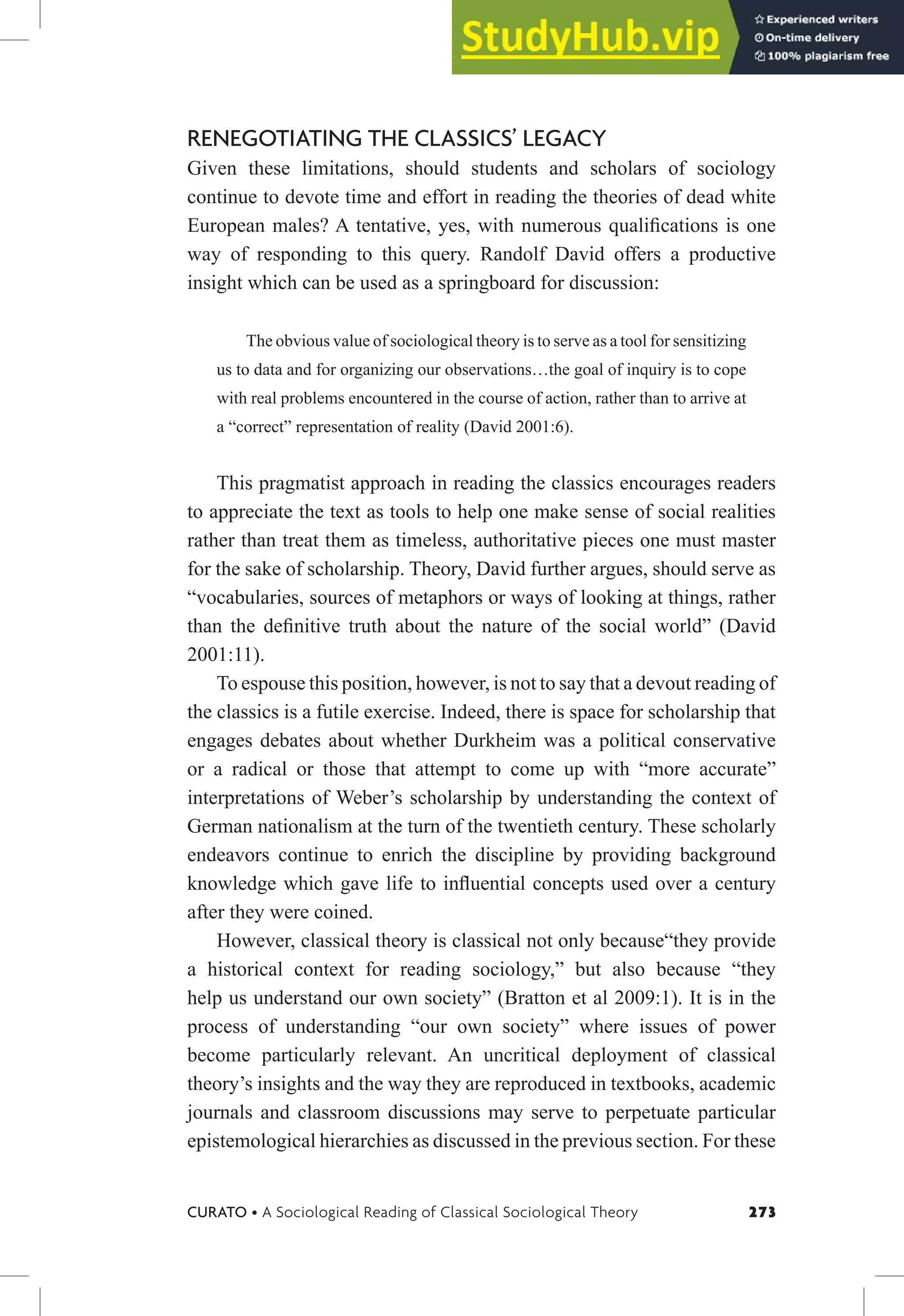
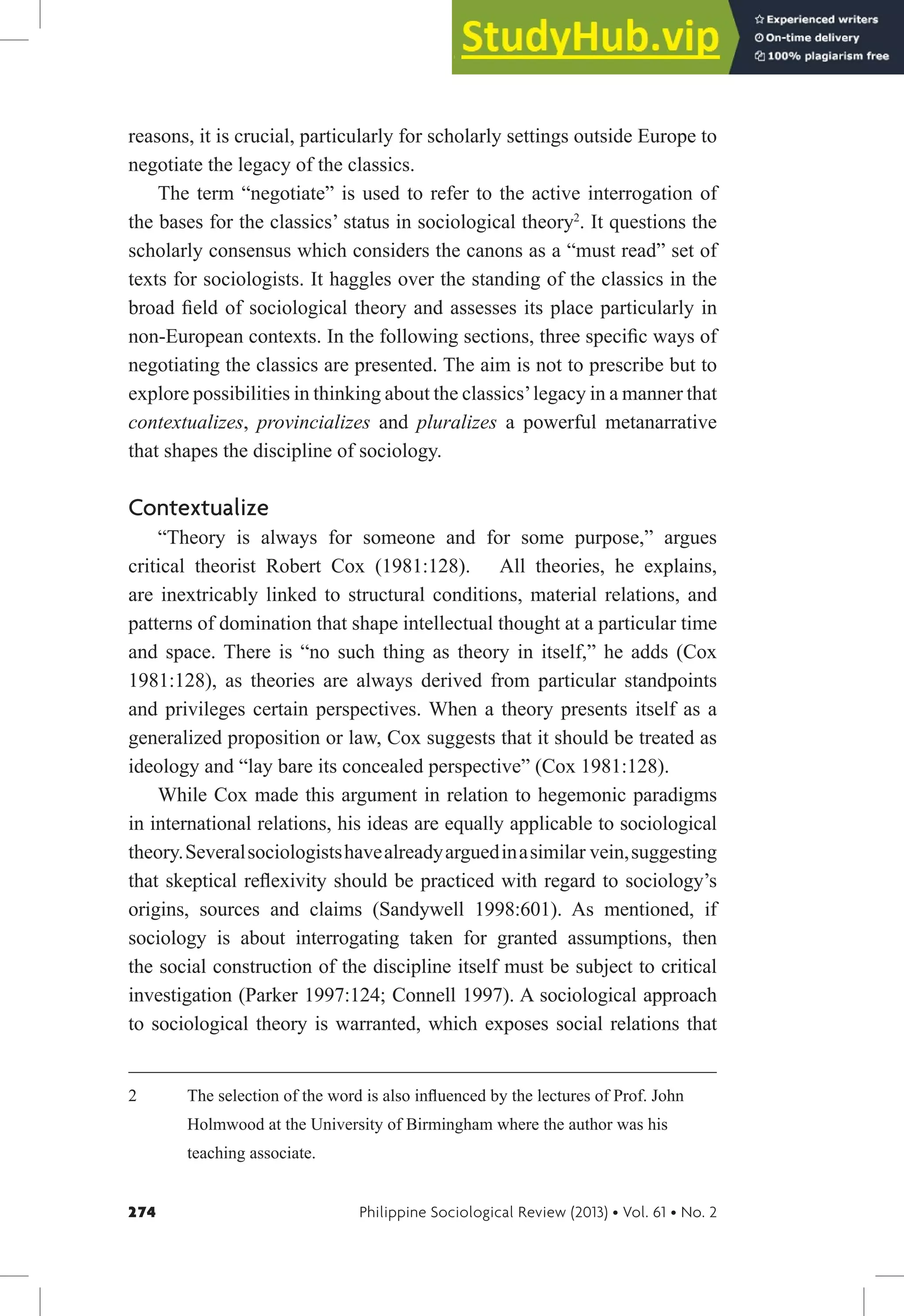
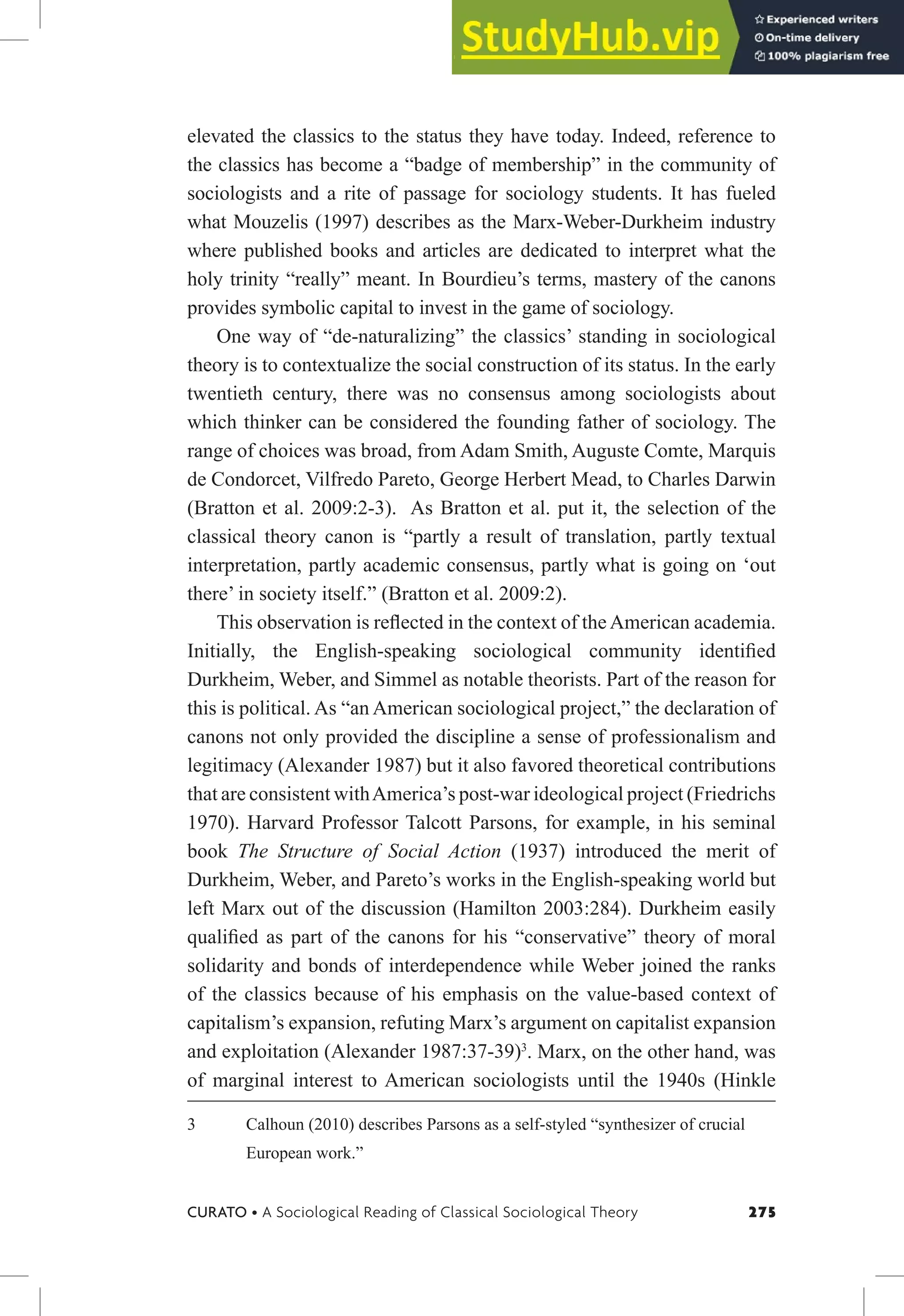
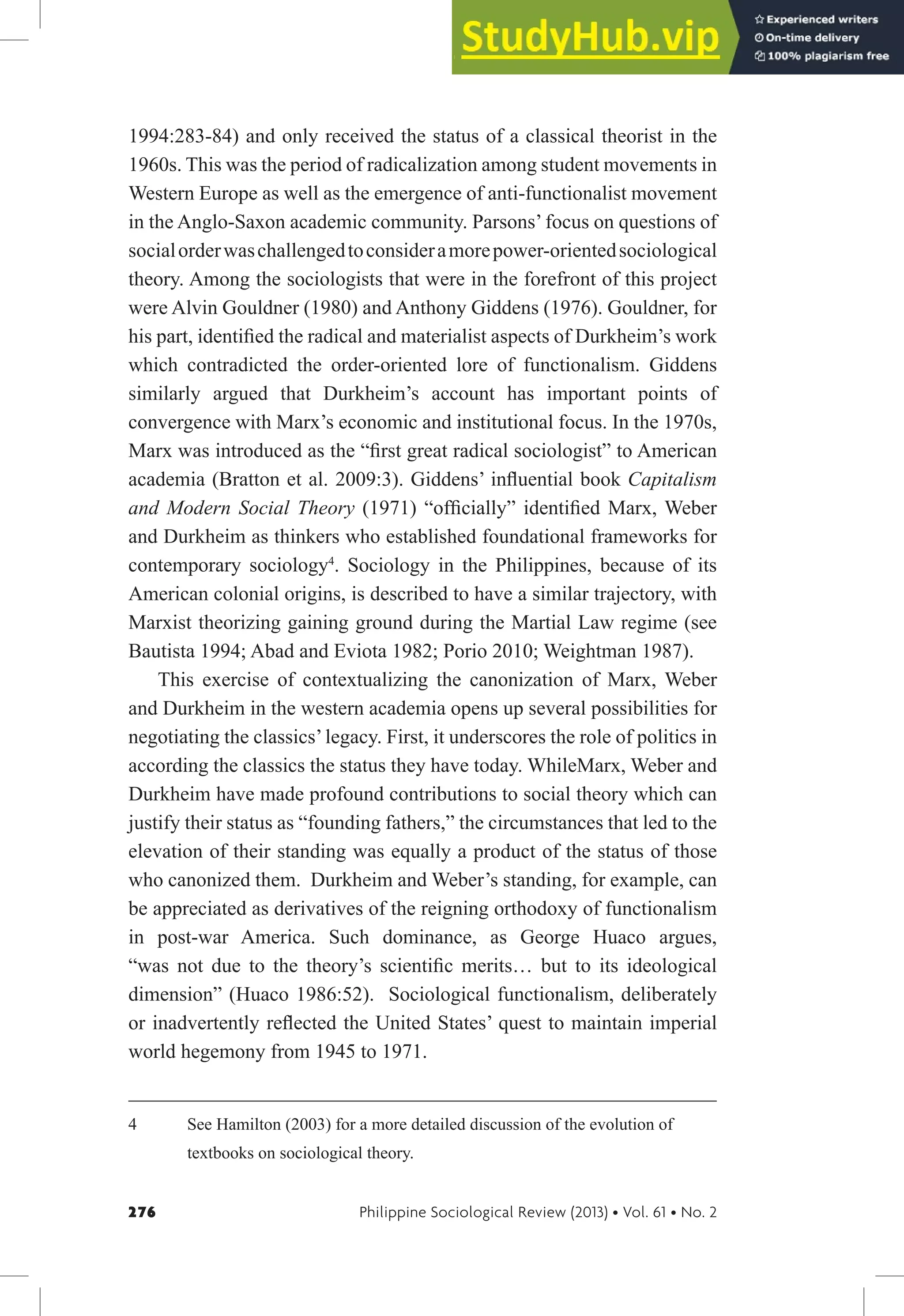
![277
CURATO • A Sociological Reading of Classical Sociological Theory
Second, contextualizing the classics allows one to gain perspective
that the selection of canonical texts is a product of people’s constructions.
It was only ifty years ago when the Anglo-Saxon community of
sociologists handpicked Marx, Durkheim, and Weber as part of the
canons. Hence, different communities of sociologists have leeway to
revise the composition of the classics that best suits their respective
contexts or reconsider whether classics are needed at all. The canons are
not static sets of texts but are as dynamic as the intellectual community
that consumes and engages them. Contextualizing the circumstances that
made the classics reach their iconic status today demystiies their standing
in sociological theory, opening up spaces for further contestation and
relection on their relevance for various academic contexts.
Provincialize
One response to the classics’ tendency to universalize their particular
historical experience is to “provincialize Europe.” Coined by Bengali
historiographer Dipesh Chakrabarty, to provincialize Europe is to:
[…] decenter an imaginary igure that remains deeply embedded
in clichéd and shorthand forms in some everyday habits of thought that
invariably subtend attempts in the social sciences to address questions of
political modernity (Chakrabarty 2000:4).
In practice, this entails exposing the limits of universal categories by
disclosing how un-universal or provincial the bases of these categories are.
Modernity as theorized by Marx, Weber, and Durkheim, is an example
of this category. It is dificult to divorce the category of modernity from
the intellectual traditions of Europe, in the same way that concepts such
as civil society, scientiic rationality, and the public sphere “all bear the
burden of European thought and history” (Chakrabarty 2000:4). From
the perspective of colonized people, modernity is always “something that
had already happened somewhere else” (Chakrabarty 1997:373).
To provincialize, however, is not to reject European thought or render
“postcolonial revenge.” Instead, it is to recognize both the indispensability
and inadequacy of European ideas in theorizing modernity in non-
Western nations. (Chakrabarty 2000:16). Hence, the classics can be](https://image.slidesharecdn.com/asociologicalreadingofclassicalsociologicaltheory-230805211015-bff21ce0/75/A-Sociological-Reading-Of-Classical-Sociological-Theory-13-2048.jpg)

![279
CURATO • A Sociological Reading of Classical Sociological Theory
at the non-Western other. Malaysian sociologist Syed Farid Alas refers to
this as “autonomous sociology” (see Alatas 2010; Alatas and Sinha 2001)
where the work of Jose Rizal is considered as exemplar:
In Rizal’s thought, the corrupt Spanish colonial government and its
oficials oppress and exploit the Filipinos, while blaming the backwardness
of Filipinos on their alleged laziness. But Rizal’s project was to show that in
fact the Filipinos were a relatively advanced society in pre-colonial times,
and that their backwardness was a product of colonialism… In fact, Rizal was
extremely critical of the ‘boasted ministers of God [the friars] and propagators
of light (!) [who] have not sowed nor do they sow Christian moral, they have
not taught religion but rituals and superstitions (Alatas 2010:31; emphasis in
the original).
Rather than celebrating colonial knowledge as mark of progress or
a mechanism of “diffusing” Enlightenment ideals to colonials, Rizal
exposes the irrationalities of colonial Church and state from the point
of view of the colonized. He explained the seeming “backwardness” of
the Philippines not because of indolence as the Spanish have purported
but because of the Filipino’s resistance to work under the encomenderos
(Alatas 2010:32). To quote Rizal, “the miseries of a people without
freedom should not be imputed to the people but to their rulers” (Rizal
1963:31). For Alatas, the work of Rizal, together with Ibn Khaldūn,
can be used as examples for an autonomous sociological tradition that
creatively applies theories in a manner that is not intellectually dominated
by another tradition (Alatas 2010:37). They also reverse the subject-
object dichotomy where white European males are not the only knowing
subjects which provide concepts and theory but can also be objects of
sociological inquiry. This, it is argued, is an important component of
negotiating the classics. The question of “who looks at whom” frames
understandings of social realities and creates spaces for multicultural
understandings of various civilizational backgrounds.
Second, provincializing Europe entails rendering the “constituted
other” visible through what Gurminder Bhambra calls “connected
sociologies” (Bhambra 2007a; 2007b; 2010). The premise of this
argument is that the world today as it was in the past is a product of](https://image.slidesharecdn.com/asociologicalreadingofclassicalsociologicaltheory-230805211015-bff21ce0/75/A-Sociological-Reading-Of-Classical-Sociological-Theory-15-2048.jpg)
